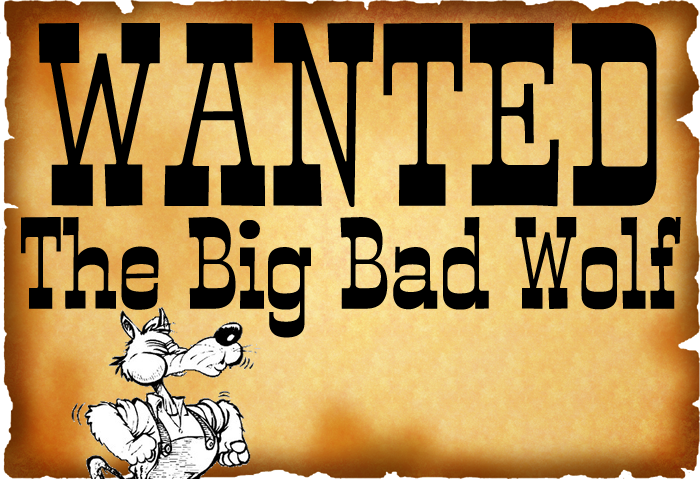As I was oozing around the blogosphere today I came across Write On Edge (a now defunct site of writing prompts). I love checking out writing prompts and memes for inspiration even when I don’t use them, and they have an interesting one: Red Writing Hood. They didn’t have this week’s prompt posted so I kept looking around.
And then this image popped into my head:
And I thought, “You know, I think I have something here”. So with just the meme as my prompt, here’s what I came up with today.
Defenders of Wildlife used to have a bumper sticker (maybe they still do) that read: “Little Red Riding Hood Lied – Restore the Wolf!” But what if she didn’t lie? Maybe her story just got blown out of proportion and people got carried away with it until one day it became the one where she got eaten by the wolf, instead of just being scared by the wolf. Or something like that. Anyway, I’m inclined to give Red the benefit of the doubt and believe that they got her story wrong after a while.
Wolves aren’t evil. Are we all on the same page about this? They’re predators, and they have a job to do – that is, eating other animals. I know we don’t always like that, but it’s a fact of nature; and nature has a way of being very brutal and ugly at times. We can’t pretend that the natural world consists only of sunshine and flowers – we have to be able to look at the unpleasant stuff too. Lions eat zebras alive. That sucks, but it’s real. And maggots are creepy, true story. But they’re still a valuable part of the natural world. Think of what would happen if nothing decayed… we’d be swimming in refuse and dead things. Nobody wants that.
I’m straying from my original point which was wolves. As important as it is not to demonize them, it’s also important not pretend that they’re sweet, cuddly animals that do no wrong. Living with big predators in your backyard is a challenge. Especially for folks who raise livestock for a living. Ranchers out west have legitimate concerns about wolves and other predators, but there are solutions. And wolves are far from the only problem ranchers face – they’re just a big target.
But wolves and other big predators (aka top-level predators) play an important role in their ecosystems, and we need them here in the US. The out-of-control deer and coyote populations in many parts of the country are a good example of what happens when we lose top-level predators, but it’s only the most visible one. The New York Times (along with numerous professional scientific journals) has published a number of articles on the increase in biological diversity in Yellowstone National Park following the re-introduction of wolves in 1995. Wolves have affected that ecosystem from the trees to the songbirds and right down to the water quality in the Yellowstone River. Rewilding efforts in the US and Europe recognize the imbalance a lack of large predators creates, and work on restoring big predators that are missing from many ecosystems.
Wolves were de-listed from the endangered species list not too long ago in several states, and the wolf killing out west is distressing. I don’t see a problem with de-listing wolves in general when the population is stable, but I trust the biologists who say that these populations weren’t ready for an all-out hunting season. And it bothers me that the decision to de-list them in the first place wasn’t made by scientists – the people who actually study these animals and know something about them. No, that decision was made by Congress and that ticks me off. That means that the decision was political and made by people whose interests are in big businesses and money, and who may or may not know anything about the biology or ecology of this species. I just love people who put no stock into scientific research. You know, because who can trust those shady scientists?
There are efforts to get the wolf put back on the endangered species list by organizations who recognize the value of scientific research. This isn’t a knee-jerk “let’s save the wolves because they’re awesome” movement (although I know there are those factions out there). It’s based on research which has biologists concerned for the long-term survival and genetic health of the species. Which is exactly what the endangered species list was meant to help protect. To learn more about wolves and what’s happening with them across the US and the world visit the International Wolf Center.
Update: in January 2015, 21 wildlife and conservation organizations banded together and petitioned the US Fish & Wildlife Service with a plan that balances keeping wolves protected while giving landowners options for managing wolves near them. Read the full article by The Humane Society of the US’s President Wane Pacelle: Finding Balance in the Wolf Wars.
So after all was said and done, what do you think really happened to Little Red Riding Hood? Was she eaten? Or just given a scare by a big animal? Maybe it was only a brief encounter; maybe she even felt lucky to see such a beautiful creature in the wild. But no matter what happened to her, the end result for the wolf in this story was never in doubt – it was hunted down and killed.
For more information on rewilding and the restoration of large predators, visit The Rewilding Institute’s ‘What Is Rewilding‘ page.





2 thoughts on “Wolves Are Just Predators”